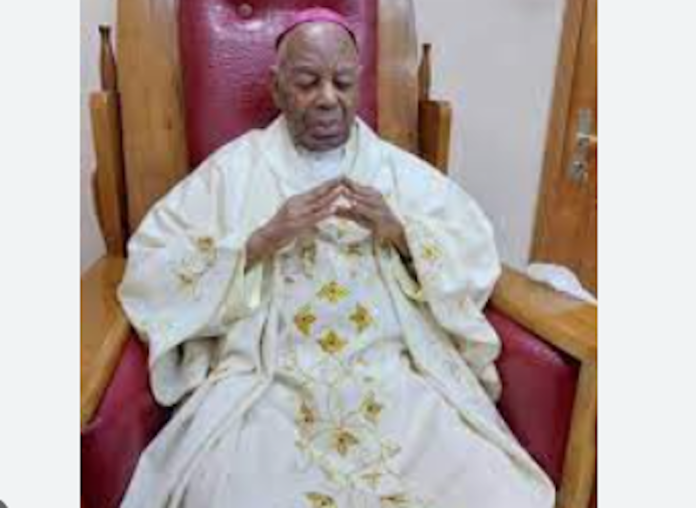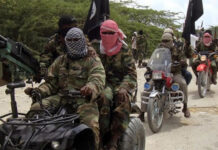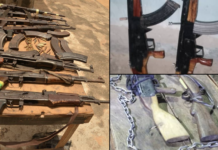Catholic Bishops across Africa have unanimously maintained the church’s opposition to homosexual unions.
While reacting to the document – Fiducia Supplicans – issued recently by the Vatican, the Bishops said there is no possibility of the church blessing same-sex unions and activities.
The Bishops are from Nigeria, Cameroun, Malawi, Zambia, Burkina Faso, Niger, Ghana, Uganda, Zimbabwe, South Africa, Botswana, and Eswatini, Congo and Madagascar.
The position of the Catholic Bishops Conference in Africa was revealed by Rev Fr. Okhueleigbe Osemhantie of the Catholic Secretariat of Nigeria (CSN) Media.
According to Osemhantie, the Bishops Conference of Cameroun said it remained faithful to the constant teaching of Ecclesial Tradition, which declares acts of homosexuality intrinsically disordered and contrary to the natural law as contained in the Catechism of the Catholic Church n. 2357.
“We, the Bishops of Cameroon, reiterate our disapproval of homosexuality and homosexual unions. Consequently, we formally forbid all blessings of homosexual couples in the Church of Cameroon.”
In Malawi, the Catholic bishops said blessings of any kind for same-sex unions are not permitted in the country.
“We direct that for pastoral reasons, blessings of any kind and for same-sex unions of any kind, are not permitted in Malawi,” said the bishops.
On their part, Catholic Bishops Conference in Zambia said:
“To avoid any pastoral confusion and ambiguity as well as not to break the law of our country which forbids same-sex unions and activities, and while listening to our cultural heritage which does not accept same-sex relationships. The guidelines in Fiducia Supplicans are for further reflection and not for implementation in Zambia.”
Similarly, Catholic Bishops Conference of Nigeria (CBCN) said there is no possibility of the Church blessing same-sex unions and activities, adding that permitting such blessings would go against God’s law, the teachings of the Church, the laws of our nation and the cultural sensibilities of our people
Catholic bishops in Burkina Faso and Niger said the church doctrine on marriage does not change, adding that the Catholic church does not approve of irregular or same-sex unions.
Also, the Kenya Conference of Catholic Bishops argued that the Fiducia Supplicans document does not in any way approve of ‘Same-sex Marriages’ nor try to give a back-door recognition of such a union.
“It does not seek an alternative ‘union blessing’ to substitute a Sacramental marriage.”
“This document does not change in any way the understanding of Marriage as a Sacrament in the Church, an indissoluble union between a man and a woman, for life.”
In the same vein, Catholic Bishops of South Africa, Botswana, and Eswatini said the suggestions offered by the declaration may be taken as a guide with prudence.
“We will guide further on how such a blessing may be requested and granted to avoid the confusion the document warns against”.
Catholic Bishops in Ghana said the Vatican Declaration does not permit Catholic priests to bless same-sex marriages.
They said the document defined marriage as an “exclusive, stable, and indissoluble union between a man and a woman, naturally open to the generation of children.
Zimbabwean bishops said that based on the respect of the law of the land, culture and for moral reasons, they have instructed pastors to desist from actions that may be deemed as the blessing of same-sex unions bringing confusion and even scandal to our people
However, the Ugandan Catholic Bishop Conference tried to clarify the Vatican document, saying that the blessing that the Declaration said could be given to everyone referred to prayers that people may request.
“For those in the state of sin, the prayers are meant to lead them to conversion. Therefore, the prayers for persons in same-sex relationships are not intended to legitimise their way of life, but to lead them on the path of conversion,” they said.
While also reacting to the controversy generated by the Vatican statement, the President of the Symposium of Episcopal Conferences of Africa and Madagascar (SECAM), and Cardinal Ambongo of Congo said:
‘The ambiguity of this declaration, which lends itself to many interpretations and manipulations, is causing much perplexity among the faithful. I believe that we need to speak out clearly on this issue to give clear guidance to our Christians”.
Africa is home to 265 million Catholics or nearly a quarter of the world’s 1.3 billion Catholics. Many of those Catholics live and their churches operate in societies where homosexuality is condemned and outlawed.
Out of the continent’s 54 countries, 31 have laws criminalising homosexuality, more than any other continent in the world.
























